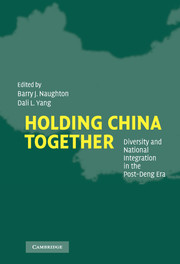Book contents
- Frontmatter
- Contents
- List of Figures and Tables
- List of Contributors
- Acknowledgments
- Holding China Together: Introduction
- PART ONE THE INSTITUTIONS FOR POLITICAL AND ECONOMIC CONTROL: ADAPTATION OF A HIERARCHICAL SYSTEM
- 1 Political Localism Versus Institutional Restraints: Elite Recruitment in the Jiang Era
- 2 The Institutionalization of Elite Management in China
- 3 The Cadre Evaluation System at the Grass Roots: The Paradox of Party Rule
- 4 Economic Transformation and State Rebuilding in China
- PART TWO CASE STUDIES OF POLICY IMPLEMENTATION
- Index
3 - The Cadre Evaluation System at the Grass Roots: The Paradox of Party Rule
Published online by Cambridge University Press: 08 December 2009
- Frontmatter
- Contents
- List of Figures and Tables
- List of Contributors
- Acknowledgments
- Holding China Together: Introduction
- PART ONE THE INSTITUTIONS FOR POLITICAL AND ECONOMIC CONTROL: ADAPTATION OF A HIERARCHICAL SYSTEM
- 1 Political Localism Versus Institutional Restraints: Elite Recruitment in the Jiang Era
- 2 The Institutionalization of Elite Management in China
- 3 The Cadre Evaluation System at the Grass Roots: The Paradox of Party Rule
- 4 Economic Transformation and State Rebuilding in China
- PART TWO CASE STUDIES OF POLICY IMPLEMENTATION
- Index
Summary
The Chinese party-state shares with other large, hierarchical organizations significant agency problems; local agents of the state tend to be have opportunistically, contrary to the interests of their principals. Such agency problems stem from conflicts of interest between principals and agents and from information asymmetries that typically characterize principal–agent relations. State officials in China employ a formal evaluation system (kaohe zhidu) to control the behavior of their subordinates. Drawing on principal–agent theory, this paper contends that the nature of the evaluation system helps to explain dysfunctional aspects of policy implementation at the grass roots and that problems with policy implementation, in turn, help to explain subsequent changes in the evaluation system itself. This characterization is consistent with adaptive learning on the part of principals. In the final section, the chapter argues that, paradoxically, even as the evaluation system has exacerbated problems in policy implementation, it has simultaneously contributed to the durability of rule by the Chinese Communist Party (CCP). Indeed, the relative stability of CCP rule, in contrast to the loss of power by communist parties in other former socialist states and contrary to claims of pervasive political decay in China, demands explanation.
The chapter begins by providing some background on the development of the cadre evaluation system since the initiation of reform in 1978, arguing that changes in cadre evaluation represent an early and important element of political reform in China – albeit not democratic political reform. The next section analyzes the characteristics of the system in terms of principal–agent theory.
- Type
- Chapter
- Information
- Holding China TogetherDiversity and National Integration in the Post-Deng Era, pp. 101 - 119Publisher: Cambridge University PressPrint publication year: 2004
- 142
- Cited by



